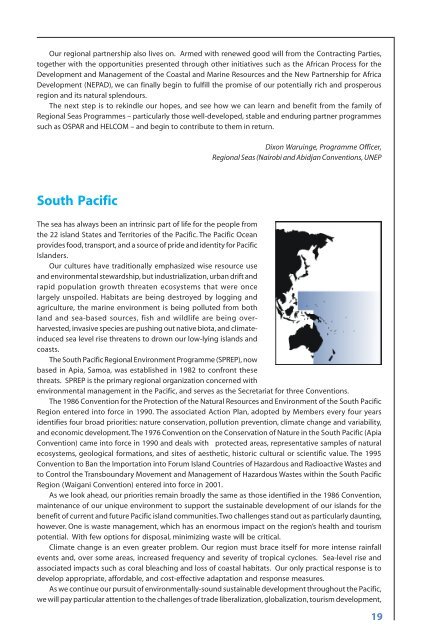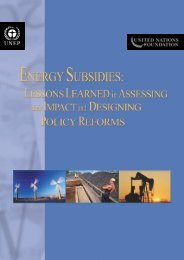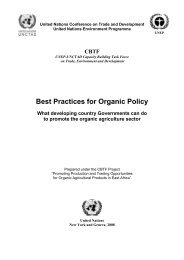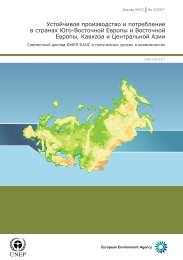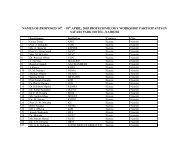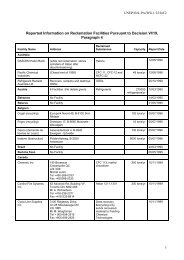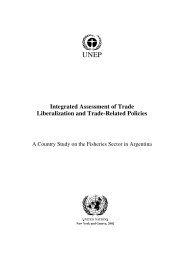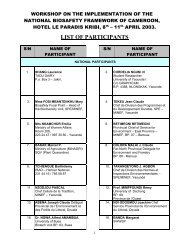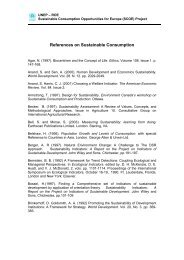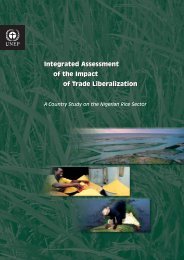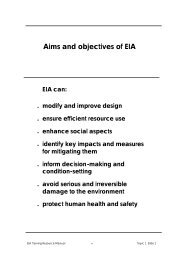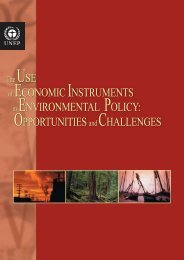Regional Seas: Strategies for sustainable development - UNEP
Regional Seas: Strategies for sustainable development - UNEP
Regional Seas: Strategies for sustainable development - UNEP
You also want an ePaper? Increase the reach of your titles
YUMPU automatically turns print PDFs into web optimized ePapers that Google loves.
Our regional partnership also lives on. Armed with renewed good will from the Contracting Parties,<br />
together with the opportunities presented through other initiatives such as the African Process <strong>for</strong> the<br />
Development and Management of the Coastal and Marine Resources and the New Partnership <strong>for</strong> Africa<br />
Development (NEPAD), we can finally begin to fulfill the promise of our potentially rich and prosperous<br />
region and its natural splendours.<br />
The next step is to rekindle our hopes, and see how we can learn and benefit from the family of<br />
<strong>Regional</strong> <strong>Seas</strong> Programmes – particularly those well-developed, stable and enduring partner programmes<br />
such as OSPAR and HELCOM – and begin to contribute to them in return.<br />
Dixon Waruinge, Programme Officer,<br />
<strong>Regional</strong> <strong>Seas</strong> (Nairobi and Abidjan Conventions, <strong>UNEP</strong><br />
South Pacific<br />
The sea has always been an intrinsic part of life <strong>for</strong> the people from<br />
the 22 island States and Territories of the Pacific. The Pacific Ocean<br />
provides food, transport, and a source of pride and identity <strong>for</strong> Pacific<br />
Islanders.<br />
Our cultures have traditionally emphasized wise resource use<br />
and environmental stewardship, but industrialization, urban drift and<br />
rapid population growth threaten ecosystems that were once<br />
largely unspoiled. Habitats are being destroyed by logging and<br />
agriculture, the marine environment is being polluted from both<br />
land and sea-based sources, fish and wildlife are being overharvested,<br />
invasive species are pushing out native biota, and climateinduced<br />
sea level rise threatens to drown our low-lying islands and<br />
coasts.<br />
The South Pacific <strong>Regional</strong> Environment Programme (SPREP), now<br />
based in Apia, Samoa, was established in 1982 to confront these<br />
threats. SPREP is the primary regional organization concerned with<br />
environmental management in the Pacific, and serves as the Secretariat <strong>for</strong> three Conventions.<br />
The 1986 Convention <strong>for</strong> the Protection of the Natural Resources and Environment of the South Pacific<br />
Region entered into <strong>for</strong>ce in 1990. The associated Action Plan, adopted by Members every four years<br />
identifies four broad priorities: nature conservation, pollution prevention, climate change and variability,<br />
and economic <strong>development</strong>. The 1976 Convention on the Conservation of Nature in the South Pacific (Apia<br />
Convention) came into <strong>for</strong>ce in 1990 and deals with protected areas, representative samples of natural<br />
ecosystems, geological <strong>for</strong>mations, and sites of aesthetic, historic cultural or scientific value. The 1995<br />
Convention to Ban the Importation into Forum Island Countries of Hazardous and Radioactive Wastes and<br />
to Control the Transboundary Movement and Management of Hazardous Wastes within the South Pacific<br />
Region (Waigani Convention) entered into <strong>for</strong>ce in 2001.<br />
As we look ahead, our priorities remain broadly the same as those identified in the 1986 Convention,<br />
maintenance of our unique environment to support the <strong>sustainable</strong> <strong>development</strong> of our islands <strong>for</strong> the<br />
benefit of current and future Pacific island communities. Two challenges stand out as particularly daunting,<br />
however. One is waste management, which has an enormous impact on the region’s health and tourism<br />
potential. With few options <strong>for</strong> disposal, minimizing waste will be critical.<br />
Climate change is an even greater problem. Our region must brace itself <strong>for</strong> more intense rainfall<br />
events and, over some areas, increased frequency and severity of tropical cyclones. Sea-level rise and<br />
associated impacts such as coral bleaching and loss of coastal habitats. Our only practical response is to<br />
develop appropriate, af<strong>for</strong>dable, and cost-effective adaptation and response measures.<br />
As we continue our pursuit of environmentally-sound <strong>sustainable</strong> <strong>development</strong> throughout the Pacific,<br />
we will pay particular attention to the challenges of trade liberalization, globalization, tourism <strong>development</strong>,<br />
19


